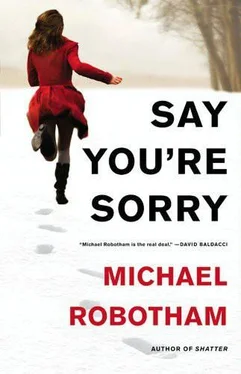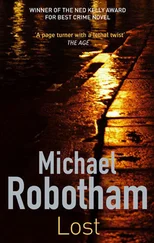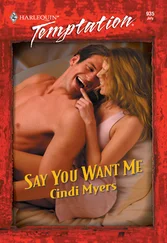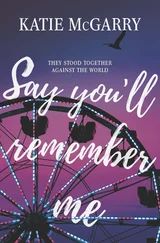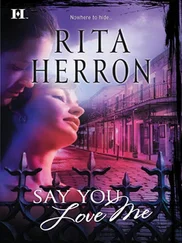Michael Robotham - Say You're sorry
Здесь есть возможность читать онлайн «Michael Robotham - Say You're sorry» весь текст электронной книги совершенно бесплатно (целиком полную версию без сокращений). В некоторых случаях можно слушать аудио, скачать через торрент в формате fb2 и присутствует краткое содержание. Жанр: Триллер, на английском языке. Описание произведения, (предисловие) а так же отзывы посетителей доступны на портале библиотеки ЛибКат.
- Название:Say You're sorry
- Автор:
- Жанр:
- Год:неизвестен
- ISBN:нет данных
- Рейтинг книги:4 / 5. Голосов: 1
-
Избранное:Добавить в избранное
- Отзывы:
-
Ваша оценка:
- 80
- 1
- 2
- 3
- 4
- 5
Say You're sorry: краткое содержание, описание и аннотация
Предлагаем к чтению аннотацию, описание, краткое содержание или предисловие (зависит от того, что написал сам автор книги «Say You're sorry»). Если вы не нашли необходимую информацию о книге — напишите в комментариях, мы постараемся отыскать её.
Say You're sorry — читать онлайн бесплатно полную книгу (весь текст) целиком
Ниже представлен текст книги, разбитый по страницам. Система сохранения места последней прочитанной страницы, позволяет с удобством читать онлайн бесплатно книгу «Say You're sorry», без необходимости каждый раз заново искать на чём Вы остановились. Поставьте закладку, и сможете в любой момент перейти на страницу, на которой закончили чтение.
Интервал:
Закладка:
The vertical blinds are drawn in the pathologist’s office. I knock. A voice tells me to enter. John Leece is sitting in semi-darkness, reclined on a leather office chair with a wet flannel over his eyes. A lone desk lamp throws a circle of light over a series of post-mortem photographs arranged on his desk.
“A migraine,” he explains, without removing the flannel. “I’ve been plagued by them since childhood.”
He motions me to sit down.
“There are times when I’d gladly put a bullet in my head to be rid of the pain.”
“Quicker than aspirin,” I say.
“Rather more permanent.”
He folds the flannel and dips his fingers in a glass of water before wiping them across his eyelids. I’m studying the photographs on his desk. One of them shows Natasha’s body beneath the ice, her face in soft focus. A shaft of sunlight has pierced the clouds and illuminated the snow, creating a halo around her head. She looks almost peaceful, as though she’s been laid to rest in a mausoleum of ice.
“You wanted to see me.”
“Have you heard of tritium?”
“No.”
“It’s a hydrogen atom that has two neutrons in the nucleus and a single proton. Although it can be a gas, it most commonly reacts with H 2 O to form tritiated water. Colorless. Odorless. Although not particularly dangerous, it’s considered to be a low-level radioactive hazard with a half-life of 12.3 years. The molecule is so small it enters the body very easily-inhalation, ingestion, even through the skin.”
“Why are you telling me this?”
“Traces of tritium showed up in Natasha’s urine. At some point she ingested the molecules, probably in contaminated water. Maybe she bathed in the water or was given it to drink.”
“Radioactive water?”
“Normally it would be excreted through her urine within about thirty days of ingestion, so she must have been contaminated in the past month.”
“Is it dangerous?”
“Tritium is created naturally in the upper atmosphere when cosmic rays strike air molecules, but it’s also produced during nuclear weapons explosions or as a by-product of nuclear reactors. It’s a pollutant that in large enough doses can cause cancers, congenital malformations and genetic mutations.”
“Where was she contaminated? Radley Lakes?”
“It’s a wildlife sanctuary. They test the water regularly. Contamination at these levels would have showed up.” He gets to his feet and crosses the office to his desk. “I talked to someone from the Nuclear Decommissioning Authority. He didn’t believe me at first. He said tritium exposure is almost unknown but that occasionally there had been accidental releases into the cooling water of nuclear power plants or into the effluent stream as waste.”
“So what you’re saying is that Natasha was exposed to some form of nuclear waste or spillage?”
“Yes.”
“From a nuclear power plant?”
“That’s the most likely source.”
“Didcot Power Station?”
“Didcot is coal and oil,” says Leece.
“Where then?”
“I was thinking about Harwell. It’s only sixteen miles south of here.”
“I thought it was decommissioned years ago,” I say.
“The last three reactors were closed in 1990 and the land was remediated, but there are still storage sites with radioactive material. It’s going to take another ten years to clean them up.”
Dr. Leece opens his laptop and calls up the results of an Internet search. Harwell was Britain’s first nuclear reactor, set up in the 1940s when the government handed over an RAF base to the Atomic Energy Research Establishment.
“Treated waste water from the old nuclear plant was piped to the Thames at a place called Sutton Courtenay, which is only a couple of miles south of Radley Lakes.”
He calls up Google Earth. A picture of the planet appears on screen, as though taken from outer space. The camera plunges towards the surface, falling onto Oxfordshire. Slowing. Stopping. Focusing.
“There’s also this place,” says Dr. Leece. “The Culham Science Center is a research laboratory experimenting with nuclear fusion as part of the Joint European Torus project.”
“Where is it?”
“About a mile south of Radley Lakes.”
“So the tritium could have come from there?”
“I’m just suggesting it’s a possibility.”
I look at the screen. The main railway line from Oxford to Didcot runs past the research center. Natasha McBain could have followed the tracks in the blizzard, trying to get home.
“Does DCI Drury know this?”
“I left him a message.”
“This is where they should be searching.”
“They won’t look now-not until after Christmas.”
I wake shivering.
I don’t know how long I’ve slept, but I can’t feel my feet or my toes. The blood has dried on my knees, but the scabs split when I bend and the wounds begin weeping again.
George said it was Christmas Eve. I dreamt that I could see my family around the table: Dad, Mum, Phoebe, Ben, Granddad and the little sister I haven’t met.
I slide on my stomach to the edge of the overhanging rock. The ground is wet and it seems colder now, cold enough to snow.
Climbing out of the crevice, I peer over the top of the rocks, studying the path. I can’t see George. Can’t hear him. The trees are like charcoal drawings above me.
I pick up the coat and brush off the leaves, putting my arms through the sleeves. It’s too long for me. I fold up the sleeves and put my hands deep in the pockets. It smells of George.
My fingers touch his mobile phone. I’m so surprised that I almost drop it. Two hands. I turn it over. Look for the power button. The screen lights up and welcomes me with music. There are no bars of signal. If I get higher, I might pick up a phone mast.
Scrambling up the embankment, I keep tripping over the hem of the coat. I have to hike it up and hold it under my arms, which makes it hard to climb because I can’t hold onto the trees.
When I reach the path, I crouch behind a rock, peering both ways. I can’t see him. I don’t want to go back the way I’ve come, so I keep following the path, away from the factory, looking for a road or a house or a car.
It’s raining and misty, but I can make out a trail that snakes between the trees. I’m climbing. That’s good. Maybe I’ll get a signal from higher ground.
Every few minutes, I stop and look at the phone, checking the signal. One bar blinks for a moment and then disappears. I wait. It flashes again. I scramble onto a rock and hold the phone above my head. A second bar of signal appears alongside the first. Wider. Stronger.
I dial 999. An operator answers.
“Hello, what service do you require, police, fire or ambulance?”
“Police. I need help.”
“Can I have your name please?”
“I’m Piper. He’s chasing me, please hurry.”
“Hold the line.”
A different voice answers this time. A woman.
“You’re through to the police. Can I have your name please?”
“I need you to come and get me. He’s going to kill me.”
“Please, tell me your name?”
“Piper Hadley.”
“Has there been an accident, Piper?”
“No. He’s coming, please help.”
“Who is coming?”
“I don’t know his name. This is his phone.”
“Where are you, Piper?”
“In a forest.”
“Whereabouts?”
“I don’t know.”
“So you’ve just wandered into nowhere?”
“I was kidnapped. I’ve managed to get away. You have to come quickly. He’s got Tash. I know he’ll punish her.”
“Who is Tash?”
“She’s my friend. We were kidnapped together.”
“What’s your friend’s name?”
“Natasha McBain.”
Читать дальшеИнтервал:
Закладка:
Похожие книги на «Say You're sorry»
Представляем Вашему вниманию похожие книги на «Say You're sorry» списком для выбора. Мы отобрали схожую по названию и смыслу литературу в надежде предоставить читателям больше вариантов отыскать новые, интересные, ещё непрочитанные произведения.
Обсуждение, отзывы о книге «Say You're sorry» и просто собственные мнения читателей. Оставьте ваши комментарии, напишите, что Вы думаете о произведении, его смысле или главных героях. Укажите что конкретно понравилось, а что нет, и почему Вы так считаете.
